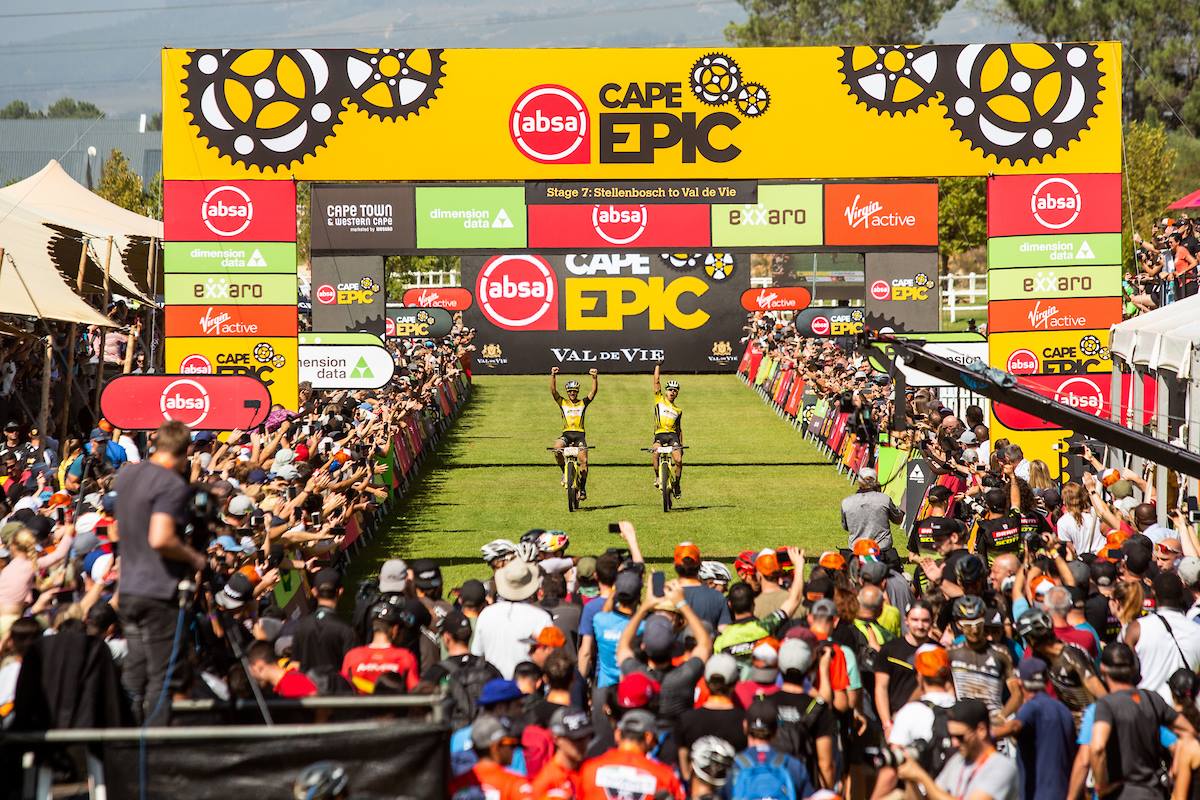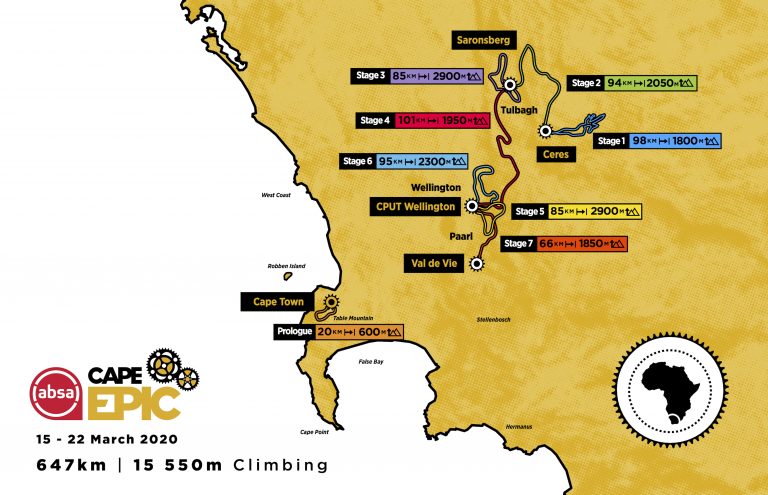After the dramatic last-minute cancellation in 2020 and then postponement by seven months, due to the response to the Covid-19 pandemic, the 2021 Absa Cape Epic is scheduled to finally go ahead from 17-24 October. But it’s definitely not going to be the Cape Epic as we know it. Here’s what you can expect.
By Sean Badenhorst
There will have been a 19-month gap between the 16th and the 17th editions of the Absa Cape Epic. A great deal has happened – and still will – in that time, of which we are all acutely aware since it’s affected not only the event, but our daily lives. That there will be a Cape Epic in 2021 is already quite an impressive feat.

Will we ever see this again? A huge crowd welcomes winners Nino Schurter and Lars Forster of SCOTT Sram at the finish of the 2019 Absa Cape Epic | Photo: Sam Clark/Cape Epic
Unlike previous Cape Epics, this one will be very different. Instead of more than 600 teams (around 1300 riders) there will be a significantly pared down field of 250 teams (500 riders). The event normally has an international rider contingent of around 45-50%. This year it will be around 25%.
International travel restrictions and quarantine mandates in certain countries, combined with the fact that South Africa has been listed by many countries as a nation with a variant of concern (some countries have started to ease this) have made it a no-brainer for many overseas entrants to defer their 2020/2021 entries to 2022 or 2023 in the hope that the world will be less limited by Covid-19 management limitations.
The South African government’s limits on the size of group gatherings and sports events range from 100 (in Level 3) to 250 (in Level 2) and 500 (in Level 1). At the corresponding dates in 2020, South Africa was in Lockdown Level 1 and, should the current patterns continue, it’s likely the country will be back in Level 1 for the 2021 Cape Epic. Although as we have come to learn, nothing is certain.
As the world’s most significant international mountain bike stage race and the only one that carries a UCI HC rating, the Cape Epic is a significant event for the world’s top racers. An eight-day battle with live online coverage is a mouth-watering prospect for mountain bike racing fans around the globe too. Will we see all the top riders competing?
“The majority of the top teams have indicated their strong interest to participate this year,” said Sarah Harrop, Absa Cape Epic Head of Marketing and Communications, who also confirmed that the event still retains its full UCI grading for the 2021 edition.
We checked with SCOTT SRAM, Cannondale Factory Racing and Specialized and none were able to confirm yet whether they will definitely have their teams at the 2021 edition. They seem keen, but understandably haven’t made firm commitments yet. Should the top international teams decide to not enter, it delivers a rare opportunity for South Africa’s top racers to contest for stage wins and overall podium places as well as useful UCI rankings points. An all-South African team has never won the overall title at the Cape Epic. The 2021 edition could well be the best shot at that for local racers.

The route for the postponed 2021 Absa Cape Epic will be the same as that planned for the cancelled 2020 edition.
According to Harrop, the event has a firm and thorough Covid-19 compliance protocol in place.
“In addition to the implementation of the five key principles of our Return to Trails policy in all areas of the event, we will continue working with the relevant authorities to ensure compliance with government regulations. We ask that all riders adhere to the safety protocols in place at the time of the event and we will provide more clarity on any such regulations and/or safety protocols as the event draws nearer,” said Harrop.
Proof of a negative Covid-19 PCR test upon registration and additional PCR testing during the event may be required and there will be the appropriate facilities in place.
In the race villages there will be strict screening and control measures, scheduled registration times for different groups and reduced sponsor activations. From a spectator perspective, no spectators or supporters will permitted in the official race areas at the villages and at the water points on the route. There will be no official spectator points as there have been in the past.
As far at the route it concerned, it’s the same route that was planned for the 2020 edition. Here’s a reminder of what lies in store for the riders (dates are obviously out of date).
Two more significant differences for an October edition of the Cape Epic are the weather and the vegetation. A March edition sees the riders facing heat – sometimes extreme – and dry and sketchy – sometimes sandy – trail surfaces. At the 2021 edition they will have cooler weather on the whole, a high likelihood of rain and possibly cold. Sections of sand in March are firmer and faster in October.
One great benefit is the region looks its best in spring and the photographs and video will look quite different where swathes of land normally brown and gray will be different shades of green.
Of all the segments of the mountain bike market in South Africa, events have been hit the hardest. Some have simply fallen away, some have had to cancel or postpone. All event organisers, those that make a living from event support and riders that compete in them have kept the embers of hope burning. When the first team rolls down the start ramp for the prologue on Sunday 17 October, that’s when the Cape Epic flame will begin to burn again.


